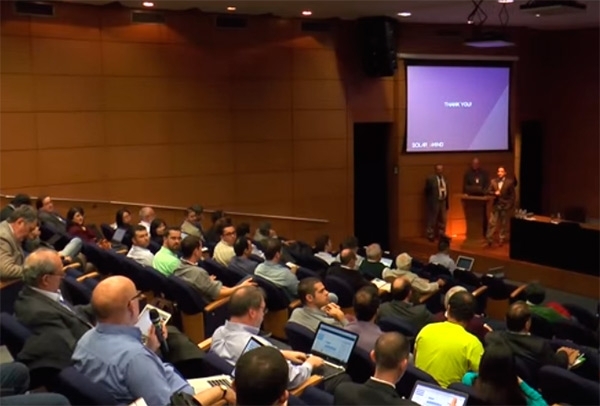

Training program offered in partnership with the George Washington University encourages startups to reformulate initial projects after coming into closer contact with the market (photo: P. Jenning/ Agência FAPESP)
Training program offered in partnership with the George Washington University encourages startups to reformulate initial projects after coming into closer contact with the market.
Training program offered in partnership with the George Washington University encourages startups to reformulate initial projects after coming into closer contact with the market.

Training program offered in partnership with the George Washington University encourages startups to reformulate initial projects after coming into closer contact with the market (photo: P. Jenning/ Agência FAPESP)
By Elton Alisson | Agência FAPESP – For two years, Scipopulis, a startup based in São Paulo, Brazil, has been developing a collective-knowledge-based smartphone app that gives users real-time information on bus routes. The project is supported by FAPESP’s Innovative Research in Small Business (PIPE) program.
The app tells users when the next bus is due at their stop and lets them share this information with other passengers. Scipopulis plans to include more information, such as the expected time of arrival at their destination, the best and worst days and times during the week to make their commute, and alternative times to leave home. It also intends to offer custom alerts about traffic conditions in the user’s city.
Scipopulis director and computer scientist Marcio Calixto Cabral says that besides commuters, the technology developed by the startup can be useful to different kinds of managers of urban transit systems.
Cabral participated in the PIPE High-Tech Entrepreneurial Training Program, hosted over the past two months by FAPESP in collaboration with the George Washington University (GWU) of Washington, DC, USA.
“We discovered it’s possible to ‘pivot’ our original business model to serve other areas and meet public transportation requirements we hadn’t seen before, such as those of city governments and even federal government agencies,” Cabral told Agência FAPESP.
This type of enrichment of a startup’s original business model through closer contact with the market is one of the main aims of the training program.
“We set out to learn whether and how we could offer the companies supported by PIPE a training program that would help them become more agile and effective by changing the way they develop their business,” said FAPESP’s Scientific Director Carlos Henrique de Brito Cruz in his opening remarks to the closing meeting of the program’s current phase on May 19.
To achieve this goal, over the past seven weeks, the 21 startups selected to participate in the first edition of the training program were encouraged to hold structured interviews with prospective customers, partners and competitors with the aim of understanding their needs, expectations and difficulties. The startups conducted 1,729 interviews altogether.
Next, they evaluated whether their new understanding of customers validated or invalidated their business model. If they found that a given hypothesis was not valid, they modified the model to adjust it to market needs. The final models were presented at a meeting in FAPESP’s auditorium.
“We noticed that the business models of the participating startups improved considerably. All of them changed their initial business models and learned a great deal during the training period,” said Fabio Kon, a member of FAPESP’s Research for Innovation Adjunct Panel.
Some startups realized that there was no market for what they planned to develop but found other possibilities and reformulated their business models during the program. Others discovered the need to make a number of adjustments to their initial ideas to meet market expectations.
A small number decided that they should start from scratch or completely rework their original project due to a lack of a market. “Realizing this sooner rather than later is very helpful because fewer resources and less time will be invested in something that won’t succeed,” Kon said.
Methodology
The training program is the first of its kind in Brazil and is similar to DC I-Corps, a program designed to foster an innovation ecosystem in the US.
DC I-Corps is sponsored by the US National Science Foundation (NSF) and is jointly run by GWU, the University of Maryland, College Park, Virginia Tech, and the Johns Hopkins University. The training program is based on the Customer Development Methodology created by Steve Blank, a professor at the University of California, Berkeley, Columbia University, and the California Institute of Technology (Caltech) in the US and a co-founder of several Silicon Valley startups.
The key to Blank’s methodology is the realization that many startups have an idea, propose a solution and define a business model based on assumptions about the market. These assumptions are not always correct, but the startups only discover their mistake when the technology that they have developed is launched in the real world.
“We want researchers to think about solving real-life problems,” said Daniel Kunitz, who heads the PIPE training program, at the event. “When researchers begin a new project, they need to believe it will have some kind of application as well as knowing about the problems faced by the market and how they can help solve them.”
Read more about the PIPE High-Tech Entrepreneurial Training Program at agencia.fapesp.br/23097.
Republish
The Agency FAPESP licenses news via Creative Commons (CC-BY-NC-ND) so that they can be republished free of charge and in a simple way by other digital or printed vehicles. Agência FAPESP must be credited as the source of the content being republished and the name of the reporter (if any) must be attributed. Using the HMTL button below allows compliance with these rules, detailed in Digital Republishing Policy FAPESP.





